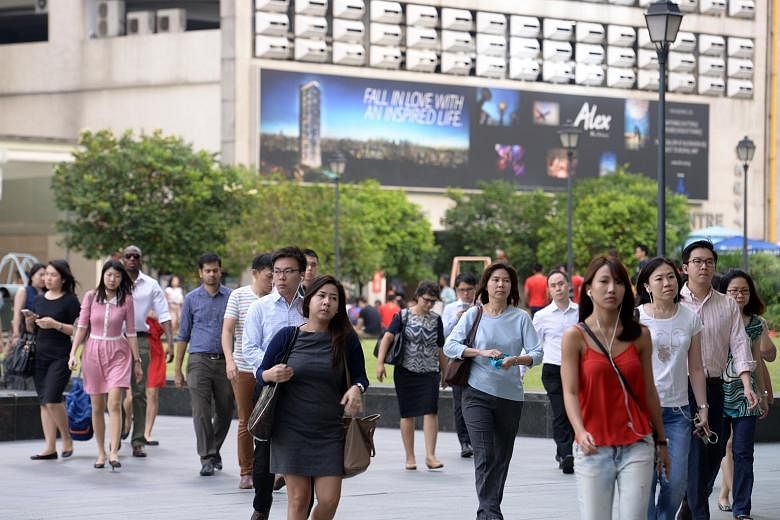As Singapore positions itself for the next phase of its economic development, one key area of focus for policymakers will be how to make sure no one is left behind.
Several key measures have been put in place in recent years, chief among them SkillsFuture.
Its initiatives, announced in Budget 2015, aim to provide a range of opportunities for workers to continue their education and training so that they can improve their skills and incomes throughout their careers.
But what about those who have left the workforce, or seem caught in a cycle of low-paying jobs?
Economists and observers say some changes may be made to social policies in the coming years to ensure a more inclusive society.
But they predict that these will be mere tweaks, rather than drastic shifts, given that much has already been done over the last few years.
One example is the $8 billion Pioneer Generation Package. Rolled out last year, it helps citizens aged 65 and above in 2014 meet their healthcare costs for life, with further subsidies on services and medicine at polyclinics and specialised outpatient clinics, among others.
Another is the Wage Credit Scheme launched in 2013, which has seen more than $2.2 billion handed out to help local businesses subsidise wage increases for low-income workers. Under the scheme, the Government co-funds 40 per cent of wage increases given to citizens earning $4,000 and below a month from 2013 to this year.
It has been extended for another two years because of the tight labour market, with co-funding for 20 per cent of wage rises given or sustained for next year and 2017.
With such big items, many observers feel there is not much more room to move in fiscal terms.
Underlying these views is the fervent belief that any further redistributive policy changes must be financially sustainable.
It was a point underscored by Deputy Prime Minister and Finance Minister Tharman Shanmugaratnam in several speeches ahead of the 2015 General Election.
He sought to dispel the "myth" that the Government can draw on investment income from the country's reserves, instead of raising taxes, to fund social spending.
"We are already maxing out on the investment income from our reserves. The Constitution allows us to spend 50 per cent of the income on our reserves and we are already maxing out; we're spending it fully on our increased social spending, on healthcare, on our infrastructure," he said at a general election rally on Sept 5.
"It's fully used, there's no more money left there that you can just take without compromising the next generation."
DBS economist Irvin Seah points out that it is the Government's prudence in adding to and managing its reserves over the decades that has allowed it to deliver such packages in the first place.
"If we take out the Net Investment Returns Contribution component from the fiscal Budget, we have been in deep deficit for many years. If not for the reserves that we accumulated over the past 50 years, we wouldn't even have the luxury of thinking about inclusive growth. It would just be growth at all costs - generating revenue to sustain the fiscal position," he said.
But as the Singapore economy moves forward, the Government has to account for increased spending in healthcare and eldercare and a changing revenue base, said Mizuho Bank economist Vishnu Varathan. The challenge is how to do so without overtaxing the working class over the next 10 to 15 years.
He suggests that Singapore's current goods and services tax (GST) rate, which stands at 7 per cent, "may be living on borrowed time, particularly if investment returns begin to get eroded by drawdowns". It is the norm in many other countries that a similar tax stands at about 10 to 15 per cent, he noted.
But several ministers have said that the Government has no plans to raise the GST for now, and would not do so without justification.
Retired four-term MP Inderjit Singh told Insight he hoped higher taxes could be avoided, as the cost of living is already a big issue in Singapore.
Rather, more active policy measures may need to be adopted to help level the playing field.
HELPING THE MIDDLE-CLASS
Observers say more can be done to ensure the vast majority of middle- income earners are able to benefit from an economy whose pace of growth is likely to be much slower than it was over the past five years.
Mr Singh, an entrepreneur, feels laws can be tightened to make it more difficult for employers to hire foreign professionals who compete directly with local professionals, managers and executives (PMEs).
This is on top of the Fair Consideration Framework, introduced last year to get companies to look for suitable Singaporeans before hiring foreign professionals.
"Local PMEs risk becoming the new poor: asset-rich but cash-poor," he said.
He also suggested enacting anti-discrimination laws to protect against discrimination on the basis of age, race and gender in hiring and firing.
West Coast GRC MP Foo Mee Har worries that PMEs may be "automated out and become redundant" if they are not sufficiently helped to become experts in their fields. While SkillsFuture is a good start, she said many programmes currently target entry-level jobs.
"What we need to do is help our PMEs become masters in their industries. It's often the mid-level managers who truly understand the processes, who know the business prospects and ground intelligence best, and who can help companies realise real productivity gains," she said.
"If we get this right, we will realise economic benefits, whilst mitigating the risk of mid-level redundancies."
MORE HELP FOR LOWER-INCOME
Even as measures are adopted to help middle-income earners tap opportunities to stay ahead in a changing economic landscape, the focus on helping those at the bottom move up must remain.
Much has been done to help lower-income earners in recent years. Workfare, made permanent in 2007 and enhanced since, is a key pillar of social security, and has boosted the wages of low-income Singaporean workers by as much as 30 per cent through Government top-ups.
The Progressive Wage Model, rolled out in 2012, has lifted the wages of those in the security, cleaning and landscape sectors.
Mr Singh thinks it is problematic to restrict the model to only a few industries: "The idea was to pick the lower-paying jobs and institute a minimum wage, with the hope that the rest of the industries will up wages for all other low-paying jobs."
"This has not happened significantly. So it is not a bad idea to expand the targeted progressive wage to an industry wide minimum wage system," he added.
But some observers feel much more can be done. Among them is former GIC chief economist Yeoh Lam Keong, who argued in a widely shared Facebook note earlier this month: "The adequacy of government spending on social protection and social security, especially for the poor and underprivileged is surely as, if not more important than how progressive it is for the middle-class."
Arguing that Workfare was a great scheme but that its monthly handouts of about $150 to $200 were "sadly inadequate", he proposed $500 to $600 primarily in cash. The cost would come up to about $1 billion a year, or about 0.3 per cent of the country's gross domestic product.
He also suggested similar boosts for the Silver Support scheme, a permanent initiative which aims to help low-income elderly Singaporeans through quarterly cash payouts.
These reforms, he added, would "largely eliminate much of the absolute poverty and hardship we still see in spite of a decade of insufficient policy action to ameliorate it, in a way we can well afford."
Such calls for more concrete steps will continue to be aired in the years ahead, and are likely to be closely studied, given the emphasis the Government has placed on ensuring social mobility, equal opportunities and an inclusive society.
But, as with every policy decision, there will be tough trade-offs - and the Government is likely to stand by its position that there has to be a fair balance between spending on present needs and securing the interests of future generations.
Barring a prolonged period of economic uncertainty ahead, those seeking more substantial changes in social policy may have to either temper their expectations or be prepared to fund such social policies through other means.


